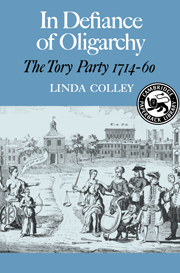Summary
‘Men are all Tories by nature’, wrote Dr Arnold in 1836, ‘when they are tolerably well off.’ The central problem of this book has been why it was that political adversity and neglect were unable to extirpate the mid-eighteenth-century tory party and its extra-parliamentary support. At Westminster diminishing tory numbers were partly offset by improved organisation. Traditional but still relevant political and religious attitudes sustained tory politicians quite as much as did their cultural debt to Oxford, and their families' extensive inter-marriage. Outside Westminster the counties and large boroughs supplied the party with a limited but irreducible electoral base - general election after general election demonstrating that, throughout this period, one-party whig government had been superimposed on a two-party, predominantly tory, state. Among the enfranchised and the unenfranchised, tory strength owed much to the influence of landlord and parson, but it also derived from the party's ideological overlap with inchoate popular prejudice and sentiment. Tory rhetoricians and publicists could address themselves to the growing aversion to the weight of indirect taxation and to the whig officials it salaried; they could apply to a popular Anglicanism which had little to do with church attendance; or they could exploit an unruly nationalism capable of overriding social divisions. All these appeals were fully in accord with the party's seventeenth-century emphases.
The fact and the circumstances of tory survival bring into question the convention whereby eighteenth-century English history is divided into three hermetically sealed periods.
- Type
- Chapter
- Information
- In Defiance of OligarchyThe Tory Party 1714-60, pp. 290 - 292Publisher: Cambridge University PressPrint publication year: 1982

